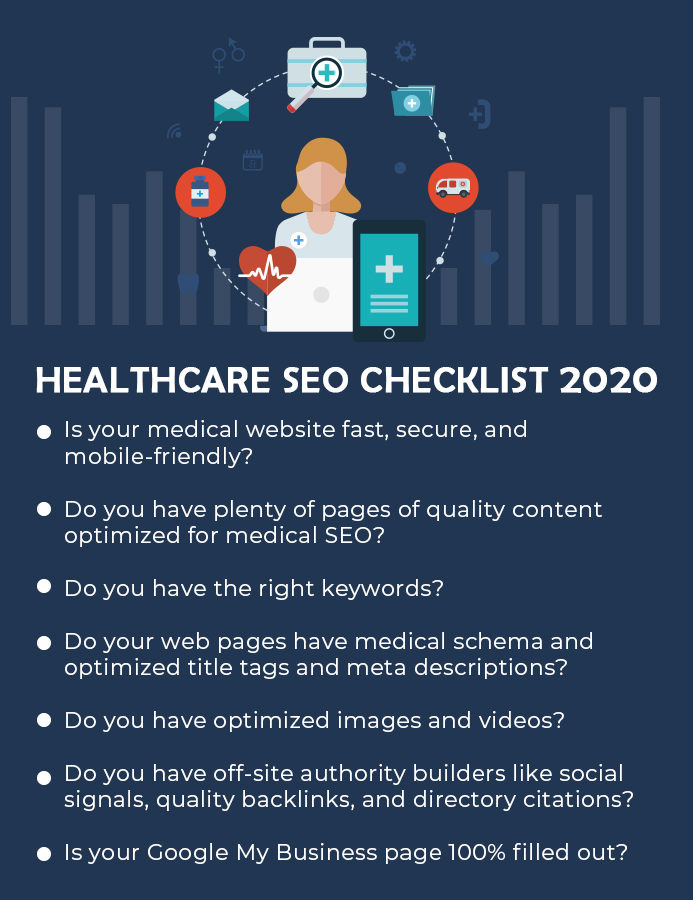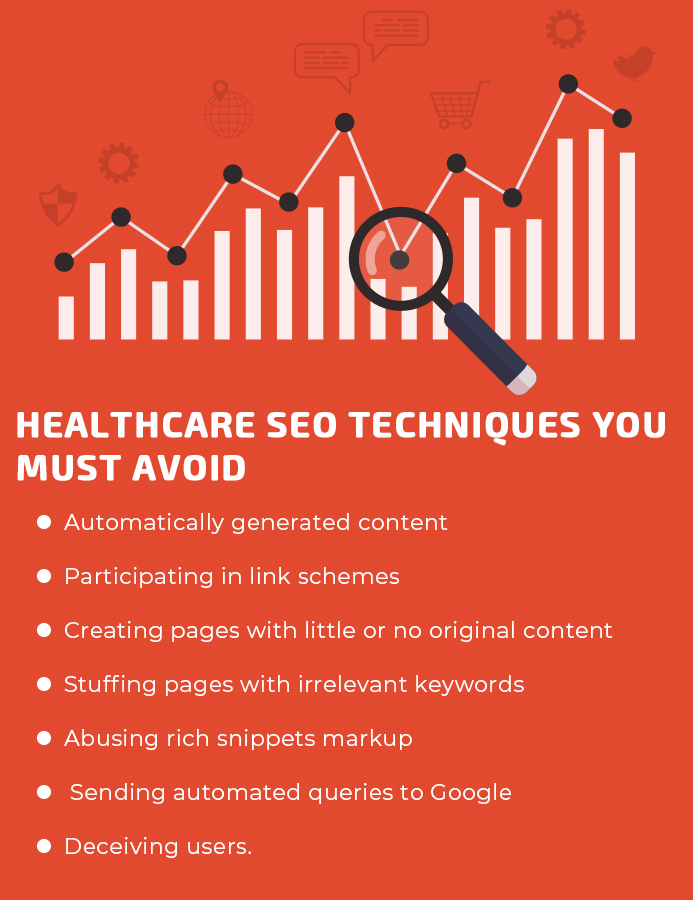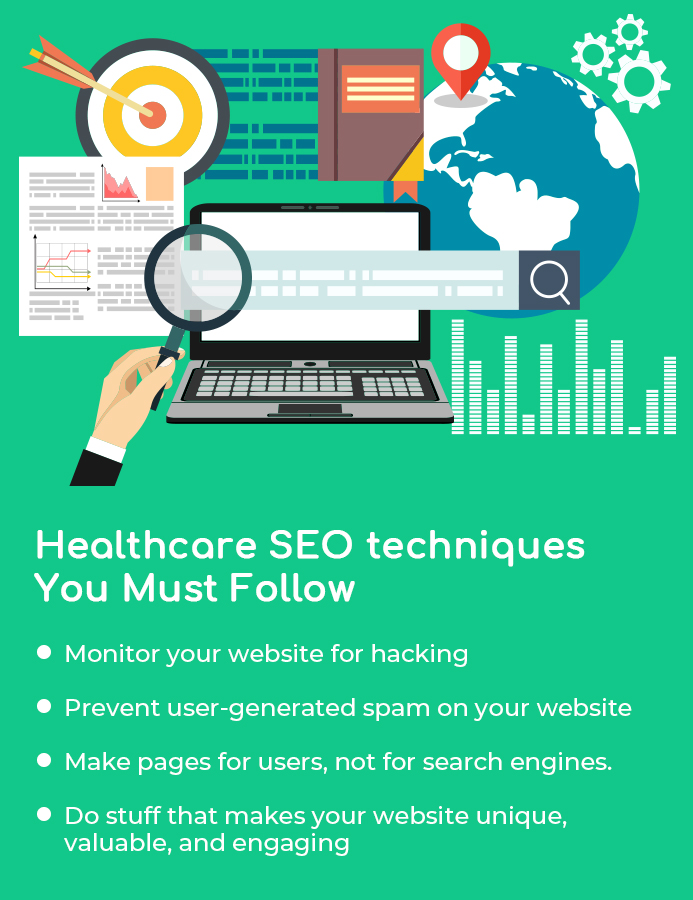SEO strategies to improve healthcare website rankings
Posted on ,
Over the years, as the marketing environment has become more and more digital-oriented, Search Engine Optimization (SEO) has become one of the key tools for healthcare providers. Whether you’re a doctor, physician, or surgeon, using proven SEO strategies tailored to your field and practice can significantly enhance your online presence, attract new patients, and ultimately grow your practice. In this blog post, our healthcare digital marketing agency will help you gain crucial knowledge about SEO for medical professionals and provide actionable tips to optimize your website rankings effectively.
Crafting a User-Friendly Healthcare Website
A user-friendly website is crucial for medical professionals, as it serves as the first thing new patients see when they try to get more information about your practice, and it leaves a lasting impression. Key elements to consider include user experience (UX) design, quick loading times, mobile responsiveness, adaptability, technical excellence, and interactive elements. A clean and visually appealing design that reflects professionalism and ease of navigation is essential.
Optimizing website performance through compression, minimizing HTTP requests, and browser caching can improve SEO performance. Mobile responsiveness is essential for search engines to prioritize mobile-friendly websites in their rankings. Interactive elements, such as online appointment scheduling and educational resources, can enhance user engagement and encourage visitors to spend more time on the site. Finally, HIPAA compliance is crucial for maintaining patient trust and highlighting a commitment to patient privacy.


Delivering High-Quality, Proofread Content
SEO for doctors plays a crucial role in enhancing a website’s online performance. It involves crafting compelling content that educates, informs, and engages the audience. Accuracy is essential in healthcare, and thorough research and fact-checking are crucial. Multimedia content, such as infographics, videos, and interactive graphics, can enhance comprehension and engagement.
Patient education is also essential, as it positions the practice as a trusted authority in the field. Proofreading is crucial for ensuring the accuracy of content and making sure you don’t get the reputation of being “not trustworthy.” Creating landing pages for specialized services, optimizing the website for local search results, and creating specific landing pages for each clinic or office can also help. By focusing on these elements, a website can enhance its reputation as a trusted healthcare provider and improve its SEO performance.


Harnessing the Power of Google My Business (GMB)
Setting up and optimizing your Google My Business profile is paramount for local search visibility. Ensure that your GMB listing includes accurate contact information, business hours, and a detailed description of your services. Encourage satisfied patients to leave positive reviews, as GMB reviews can significantly influence your practice’s online reputation and rankings. And remember, there are no “small” elements in doctor search engine marketing.
Building a Strong Social Media Presence
If we are being real, social media platforms serve as the most powerful tools for healthcare professionals. Every single practice must establish a strong social media presence to connect with patients and build a strong online presence. Selecting the right platforms like Facebook, Instagram, and LinkedIn is important, but creating and sharing valuable content that meets the needs and expectations of your potential audience is essential. Consistency is key, and regular posting schedules and responses to comments create a sense of community and make patients feel like an important part of your practice’s life.

Optimizing profiles with relevant keywords and patient testimonials can improve visibility in search results. Implementing search engine marketing strategies, such as managing PPC advertising campaigns, can also help visibility. You should also make use of tools for checking metrics and getting important data from your social media campaigns. A data-driven approach can help you both outcompete other practices and don’t become too full of yourself, as you will see room for improvement.
Actively gathering reviews and feedback
Healthcare professionals should actively gather patient reviews and feedback to make their online presence even stronger and attract new patients. Patient reviews provide valuable insights into patient experiences and significantly impact search engine optimization (SEO). Encouraging satisfied patients to share positive experiences on platforms like Google, Yelp, and Healthgrades can improve visibility in search engine results.
Incorporating relevant keywords like “nurse,” “dentist,” “surgeon,” and “doctor” in reviews can also improve visibility. Addressing negative feedback professionally and empathetically can demonstrate commitment to patient satisfaction and readiness to always put their experience as the top priority on your list. SEO for physicians is not only about looking nice; it’s about making sure your practice becomes better and better so your patients advocate for you.

Incorporating Video Content on Your Website
Healthcare content is crucial for providing accurate and relevant information to patients, empowering them to make informed decisions. But making potential patients read huge texts that are hard to understand is not the best way to make them feel positive about your practice. Video content has emerged as an engaging and shareable form of content, helping to make your SEO efforts worth the time spent on them.

Having informative videos, patient testimonials, or virtual tours on your website can catch more attention and educate audiences, encouraging longer dwell times on the website. Optimizing videos for search by including relevant keywords in titles, descriptions, and tags can help users find you faster and make your website a go-to place in your respective field.
Conducting keyword research and monitoring trends
And we saved the cream of the creams for the dessert. Keyword research lies at the heart of any successful SEO strategy. Identify relevant keywords and phrases that potential patients are likely to use when searching for healthcare services in your area. Leverage tools like Google Keyword Planner and Google Trends to uncover search trends and tailor your content accordingly. Always keep local search trends in mind to stay ahead of the competition, and adapt your SEO for doctors so it fits with what the audience looks for.
Conclusion
In conclusion, SEO for physicians involves a comprehensive approach that includes website optimization, content creation, social media engagement, and industry trend monitoring. By prioritizing the user experience, delivering high-quality content, and utilizing platforms like Google My Business and social media, medical professionals can enhance their online visibility and attract more patients. And as our agency says,
it is always better to gather strength and become a better version of yourself than to find the strength to stay afloat.

 Why Good communication Matters in Healthcare
Why Good communication Matters in Healthcare De-Escalation Tips for Handling Aggressive Patient..
De-Escalation Tips for Handling Aggressive Patient.. Reaching The Right Audience Through Target Marketi..
Reaching The Right Audience Through Target Marketi..